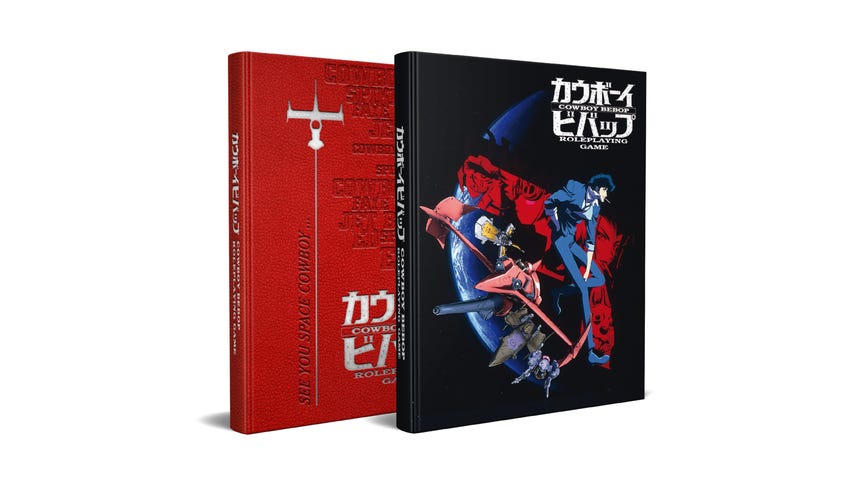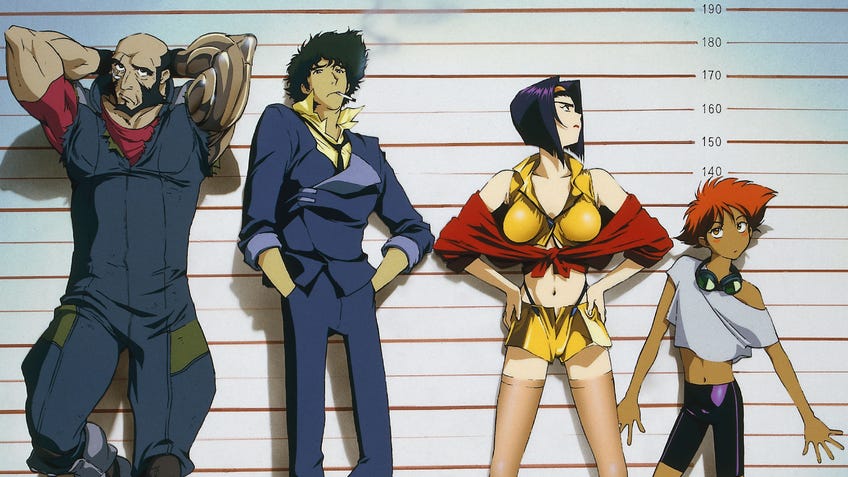Cowboy Bebop RPG is a fawning but promising tabletop adaptation of the anime - quickstart preview
Difficult dance steps keeps this jazzy adaptation from truly swinging.
The official Cowboy Bebop RPG launched its crowdfunding campaign October 19th, providing an updated look at its tabletop translation of the popular ‘90s anime. Its bespoke rules system and fervent adherence to Shinichirō Watanabe’s genre-bending work creates a rough gem of a game that might really shine with a bit more polish.
First announced late into 2021, the Cowboy Bebop RPG is the creation of Italian designer Mana Project Studio and French publisher Don’t Panic Games. The latter has a track record adapting anime properties such as Naruto, Attack on Titan and Tokyo Ghoul into tabletop games, but tackling Cowboy Bebop may be its most ambitious project to date.
Watanabe’s story of bounty hunters clinging to the edges of a solar system wracked by late-stage capitalism has enjoyed recurring popularity since first releasing in 1998 (followed by a full-length film in 2001). Brooding, roguish protagonist Spike Spiegel leads a crew of castouts and misfits as they hunt down bounties, often giving up the cash prize after discovering the truth of their circumstances. Watanabe famously described Cowboy Bebop as a mash-up of Western, detective noir, science fiction and several other genres that created an eponymous new mode of storytelling.
The upcoming tabletop RPG earnestly attempts to recreate the feeling of watching episodes of the anime amongst a group of friends sitting at the table. Each player will take on the role of a bounty hunter within Cowboy Bebop’s ragged world of stratified wealth and too few resources. The facilitator, here called the Big Shot, negotiates the fiction and rules with the players as they narrate the exploits of their own crew.
All of this scans like a technical document, obscuring the thrilling bits of game design amongst hard-to-parse descriptions.
Sessions are structured similar to a 22-minute dramatic arc - the action is sectioned by three successive tabs titled “Smooth Talk”, “3, 2, 1” and, finally, “Let’s Jam” - that gradually ratchet the tension and danger as player-characters uncover their bounty’s true motive and encounter complications. If you’ve watched even two episodes of the anime, you’re familiar with how the RPG wants to play out.
The system accomplishing this feat is a new creation from Fumble GDR and Davide Milano, but reading through the quickstart document available on the campaign page reveals something that cleaves very close to John Harper’s Blades in the Dark. Sure, it borrows clocks as a way to measure objective progress and impending threats, but it’s the modular approach to scores–er, I mean bounties and negotiation of resources that solidifies that feeling of a crew dancing on the razor’s edge between effortless success and explosive failure.

Players need to overcome tests to achieve anything dangerous or noteworthy in Cowboy Bebop RPG. A dice pool system adds an increasing number of six-sided dice depending on which tab the action is currently taking place, plus any extra for character-specific features that make fictional sense (think Ed’s hacking, Spike’s martial arts or Faye’s penchant for charming witless muscle). Rolling against a difficulty rank determined by the Big Shot, sixes and ones produce both hits and shocks, respectively - the former is spent by players for advantages, while the latter can be used by Big Shots to create obstacles, complications or increased difficulty.
Its bespoke rules system and fervent adherence to Shinichirō Watanabe’s genre-bending work creates a rough gem of a game that might really shine with a bit more polish.
There’s a lot of other systems that come into play when determining the narrative outcome of a roll. The Bounty Hunter in question will essentially barter with the Big Shot as they decide whether to push a roll, show their wounds or tick progress on a clock – they might also use a special resource represented by six bullets in a revolver chamber that dramatically increase effect at the cost of revealing hidden backstory and tying them directly to current events.
All of this is explained fully in the quickstart, but I hesitate to call it a breezy read. The first few pages of the document smartly outline the basics of playing RPGs and safety mechanics, likely assuming many will come to this game from outside a comfort level with tabletop games. The team situates players within the fictional space incredibly well, deploying some banger lines such as “a bounty is both someone to hunt down and an excuse to tell a story” and “use your character like a stolen car in an action movie” that immediately hooked me on the narrative possibilities. (Edit: Turns out this line pops up in a lot of RPGs, starting with Avery Alder's Monsterhearts and including Blades in the Dark)
The average player will likely need to fully scan the rules more than once to feel comfortable heading out on their first bounty. Example sheets and the flowcharts for rolls are shunted to the end of the document, divorced from their introductions as core elements. And I haven’t even discussed the five encounter approaches named after music genres, the Groove system and a secondary Rhythm resource girding interactions between bounty hunters.
The modular approach solidifies that feeling of a crew dancing on the razor’s edge between effortless success and explosive failure.
Right now, all of this scans like a technical document, obscuring the thrilling bits of game design amongst hard-to-parse descriptions. If the designers want anime fans to treat this as more than a novelty, the book needs another editing pass with an eye toward clarity and concise explanations.
News of an officially licensed Cowboy Bebop RPG left a bad taste in many mouths, both due to the increased number of properties creeping into the tabletop space and the poorly received Netflix live-action series that is now, by all accounts, dead in the water. But Mana Project Studios and Don’t Panic Games have managed to excite me over a future version of this book that might be the most successful licensed RPG yet produced.
The Kickstarter campaign for Cowboy Bebop RPG runs through November 16th, and backers can secure both a digital and physical copy of the core rulebook. There’s also a free quickstart version available to download, which includes pre-generated characters and a sample bounty. The publisher currently expects fulfilment to begin in November 2023.
Update: The description of Mana Project Studio and Don't Panic Games has been clarified to accurately to reflect their role on the game.


